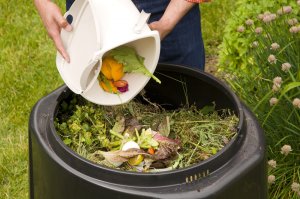By: Delilah Farrell. She’s passionate about educating people, especially youth, on the importance of sustainable living. She is a proud advocate for the UN Sustainable Development Goals.
If you’re looking for an eye-opener, calculate how many planets we would need if everybody lives like you. For many, the number will be astonishing. It may also be saddening or disappointing.
Instead of continuing or planet-poisoning patterns, we can all take steps towards eliminating our hazardous behaviors. Lifestyle changes don’t have to be elaborate in order to start making a difference. Here are 8 simple ways to begin reducing your ecological footprint.
Start a Compost Pile
Compost piles are an excellent way to reduce waste. Instead of throwing parts of fruits, herbs, vegetables, etc.. in the garbage, throw them in a compost pile. Did you know that one-third of food produced, globally, is wasted? A simple –but incredibly impactful way– to reduce this number is to compost. Your pile will eventually yield fertile soil that can be put to use in your personal or community garden.

Start a Garden
Compliment that beautiful compost pile with a garden, vice versa. Start by growing your favorite herbs and vegetables. Rather than going to the market for these items, you will be able to harvest them yourself! There is a certain feeling of accomplishment and pride that will come along with this as well.

Invest In Metal Straws
Yes, straws make a difference. Did you know that, in America alone, we use around 500 million drinking straws each day? If you do the math, the amount of plastic waste that is a result each year is astronomical. A plastic straw will take nearly 400 years to fully decompose. By using a reusable metal straw, you will reduce the amount of plastic waste being generated each day.

Slay Energy Vampires in Your Home
These creatures are lurking in every room of your apartment or household. According to House Method, these are household items that are consuming energy while not in use. Start unplugging items that are not in-use. Obviously, do not unplug the refrigerator, WiFi, or other items that should be connected to power at all times. There’s no reason for unoccupied chargers and gaming systems to be plugged in. Simply unplug them until they’re ready for use!

Start Cycle-Commuting
This tip may not apply to all, but try commuting to work via bicycle. For those who have a short commute, it may be something to consider. There are many benefits to bike commuting and it can be pretty easy to make it into a routine for your daily commute.

Don’t Shop Fast-Fashion
Fast-fashion is inexpensive clothing that is mass produced in reaction to market trends. In fact, fast-fashion is ecologically hazardous. Instead, do a little research and ensure that the clothing you wish to buy isn’t a large ecological problem. Paying a few extra dollars for something that is of much higher-quality and produced in a more ecologically-friendly manner is worth it.

Low-Flow Shower Heads
The average household showerhead uses approximately 5 gallons per minute. Low-flow showerheads use around 2.5 gallons per minute. This will result in less water waste and lower water bills as well, something that could bring a smile to anyone’s face.

Source and Shop Locally
If you think about it, a lot of the things we consume and use on a daily basis travel much more than we do. Shop and invest in local, transparent companies and products. More often than not, these local companies are invested in environmental best-practices. A great place to begin is at your local farmer’s market.

Finally, spread the word. People may criticize you or call you crazy for your efforts. The harsh reality is that we need to become conscious of the wasteful habits we have. Sustainability efforts are something that we should all begin to adopt, no matter how big or small the effort.

